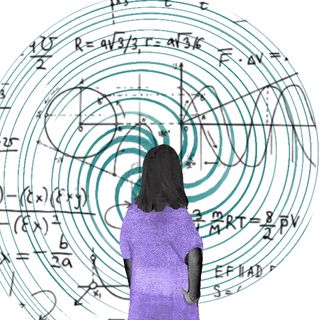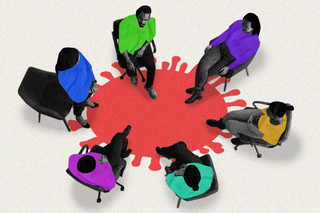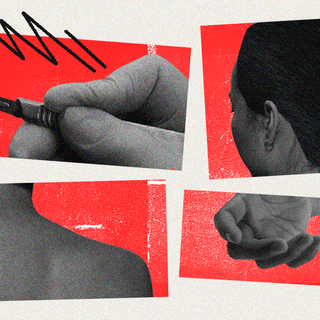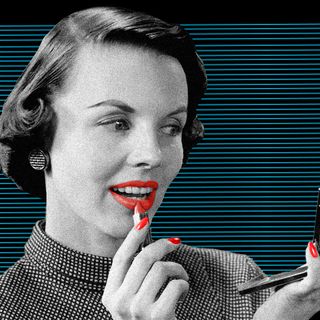
For Long Covid Patients, Support Groups Address the Limitations of Medicine
“Long Covid support groups make healing possible by validating people’s experiences even in absence of a medical diagnosis.”

Shweta Bhutada is 25, but her age does not match the pile of medicines that lies indiscriminately on her bedside table. The medicines are a result of consultations with five doctors. The doctors responded to Shweta’s debilitating knee pain along with other post-Covid19 symptoms by asking her to start physiotherapy “but didn’t say much about the diagnosis.” The pain is all in your head, they repeated.
This isn’t an unfamiliar story. Shruti, 31, experienced a minor Covid19 infection during the second wave, but she was stunned at the tenacity of her symptoms: they continued weeks, even months, after. She took the matter into her own hands, and compared notes with another friend who recovered from Covid19 some months earlier. “We heard stories from others in our network of how their memory had taken a hit, or if they couldn’t remember simple words or just mixed up things,” she says.
Most doctors were utterly unhelpful or dismissive about their symptoms, let alone going as far as providing a diagnosis. To counter the paralysis that comes with such a lack of knowledge, Shruti, along with some other Long Covid patients, formed a support group on WhatsApp where strangers could share their symptoms, experiences, and lives.
Shruti’s group is far from being one of its kind. Around this time and before, communities were emerging on every digital cul-de-sac; Facebook, Telegram, even Slack. Facebook search lists tens of hundreds of such groups; the most popular with a count of about 87,000 members. On Telegram, the “India Covid Survivors Group” channel is a community with some 400 members that include survivors as well as researchers and doctors. “It is a group of people who are suffering on a daily basis but are also coping and advocating for others online and within their social circles,” says Padma Priya D., founder of the group. Conversations about managing individual symptoms, news reports about the latest Long Covid findings, and stories of dismissals from doctors are routine exchanges.
People are coming to terms with living in a world where Covid19 ebbs sometimes in the margins and sometimes visibly. These informal communities – some running in thousands, some having a count of 14 – stand resolutely in opposition to the wariness of the medical community to acknowledge Long Covid as a valid diagnosis.
For recovered patients, support and grief groups can bring healing, as they find space to exist in a world on the edge of forgetting them.
***
There is no pattern, no standard combination of symptoms for Long Covid; brain fog could as easily be coupled with breathlessness and could accompany a loss of taste and smell. Some 204 symptoms could manifest in various permutations in the aftermath of Covid19. The biggest study to date notes that vaccines reduce Long Covid19 incidence only by 15%. Another warns of permanent cognitive decline in people who have had the Covid19 infection. A report (including sizeable data) found people had less than a one-in-five chance of making a recovery by Day 50 of their illness. “It’s draining, it’s so draining,” says Shweta.
Related on The Swaddle:
‘Long Covid’ Patients In India Are Struggling, But Their Plight Remains Unseen
This is made harder by the fact that the persistent symptoms of Long Covid, like brain fog and exhaustion, don’t have tangible markers in diagnostic investigations. Where medicine demands statistics and data, support groups promise validation, information, and comfort from knowing that their ailment is real.
“No one is thinking about Long Covid, much less talking about it,” Shruti says, which makes her WhatsApp group a safe space to listen gently and ardently. It is incredibly powerful to acknowledge someone’s perception of their own illness, helping them reconcile with their new reality, negotiate accommodations at the workplace or in their personal lives, and find a sense of normalcy that is ever so missing.
A diagnosis is critical to a person comprehending – and even processing – their ailment, as Jutel Annemarie wrote in the paper “Sociology of Diagnosis.” According to Bijaya Biswal, a public health researcher, “Long Covid support groups help in this regard and make healing possible, by validating people’s experiences even in absence of a medical diagnosis.” The online group offered something Covid19 survivors were unsure they needed: emotional support, community, resources, and patient advocacy.
It was only on Shweta’s fifth visit to a doctor that she finally received a diagnosis for Covid19 pain. After conducting a series of tests, the doctor was able to link osteoarthritis, a form of arthritis that doesn’t occur in people her age, that was related to inflammation caused due to the infection. “Again I took a bunch of medications – the pain did not subside.”
These support groups are not only crucial for finding resources and community, but also for countering the incessant medical gaslighting around Long Covid. “They kept telling me it’s in my head, it’s my weight, it’s my stress.” Over the months, Shweta says, she found herself dipping in and out of phases of self-doubt.
As a territory where research falls short and has even been misleading, Long Covid has become prey to “The Great Gaslighting.” In 2021, some professors from Harvard published a study arguing that Long Covid is completely psychological. Around the same time, a psychiatry resident in Canada called Long Covid “largely an invention of vocal patient activist groups,” referencing the advocacy of Body Politic, the first online support group for Covid19 survivors. Medicine has often stumbled before conditions that have no physical, visible clues, thus often resorting to two things: One, to refer the patient to a psychiatrist by pathologizing their malady. Two, telling them it’s all in their head.
For women, the medical gaslighting narrative is grievously old. Even now, women are far more likely to hear “It’s all in your head” than others.
Related on The Swaddle:
Even Mild Covid19 Can Change the Brain, Finds New Study
Discrediting chronic, uncommon conditions can quickly turn dangerous, when patients are misdiagnosed or given misleading advice to treat their symptoms. After anxiously detailing her Long Covid symptoms, Shweta was told to take a regimen of pain medications, which seemed like nothing out of the ordinary for her knee pain. But it was only later that she realized the doctor had prescribed her antidepressants too, without her consent. “I was taking those medicines without knowing, and throughout I was questioning myself completely.”
This isn’t an isolated instance. “I know of one person who was put on anti-anxiety meds, when in fact she had an undetected pulmonary embolism causing chest pain and palpitations,” recounts Padma. Covid19 and its aftermath are linked to heart damage, along with dysfunction in the pancreas, thyroid, and liver. Together, these accounts represent a pattern of willful ignorance. “Dismissal can also be fatal.”
For all the speculation around the credibility of Long Covid, the New England Journal of Medicine called the condition “our next national health disaster.” “If the past is any guide, they will be disbelieved, marginalized, and shunned by many members of the medical community,” warned Dr. Steven Phillips, a physician and vice president of the Covid Collaborative in Washington, D.C., and Dr. Michelle Williams, an epidemiologist.
These groups then become a safe space, where no symptoms are clinically rejected or put down to flights of fancy. When a pulmonologist told someone to “lose weight” and “be positive in life” in response to a symptom, the group thundered with angry GIFs and astonished “OMGs” at the very prospect. A member notes: “Most of us still don’t have a Long Covid diagnosis.” Body Politic started as an Instagram group, and later migrated to Slack, with some 50+ channels dedicated to documenting the varied experiences Covid19 could leave behind. One community consisted of those with symptomatic symptoms even after three months; one with those who recently recovered from ventilators; one housed caretakers and friends; one detailed employment concerns; another looked at mental health.
In some groups, there is the concerted inclusion of doctors and researchers, some even chime in to share new findings and respond to people’s queries. Just recently, the Telegram group had a Zoom session on how to increase movement that was restricted due to Covid19 fatigue. “It helps immensely and also makes doctors realize the kind of challenges we as patients face,” Padma says. “It also enables them to have conversations on empathy, on harm done by medical gaslighting on public platforms and with peers.”
Long Covid support groups then help to push the limits of the healthcare system’s imagination. “It helps patients to know they aren’t alone and drive the narrative and demand for a conscious effort to address Long Covid,” says Padma. It is a push to be curious, and to support the people who are not mere bodies with diseases.
***
These stories are an informal archive of what experiences of Long Covid look like. The support groups as civil society initiatives represent an alternate narrative to the biomedical, clinical aspects of care. American psychiatrist and psychiatric anthropologist Arthur Kleinman wrote about the difference between “disease” and “illness”; he posited that while disease predominantly occupies itself with the physical entity, illness concerns itself with a person’s perception and experience of it.
According to Bijaya, “these are the limitations of biomedicine.” “For the longest time, medicine has been fixated on the ‘treatment’ or ‘curative’ aspects of disorders rather than healing or care,” she explains. The “biomedical model” of medicine then leads to a piecemeal approach of treatment, translating into neglect that has been observed historically. If every diagnostic test comes back negative for a person dealing with chronic symptoms, symptoms that can’t be explained by a specialist, the condition may as well not exist. This category of “medically unexplained symptoms” includes conditions that remain undiagnosed through standard tests, including myalgic encephalomyelitis, also known as chronic fatigue syndrome, or ME/CFS. “The health system finds it difficult to deal with conditions that demand a more integrated approach.”
“Such support groups concern themselves with ‘illness’ rather than disease, and hence make it a priority, to acknowledge the patient’s perspective of their own condition.”
But these limitations precede Long Covid, and are likely to outlive any infection-triggered illnesses. “Medical research still lags behind when it comes to accepting people’s perception of their illnesses, and is an important aspect of health, and hence worthy of research,” adds Bijaya.
The conclusion seems to be grim: science has long divorced medicine from medicinal anthropology, “good health” from “well-being.” Long Covid support groups, then, address those gaps by building spaces of care rather than merely cure. There is kindness, support, and community. In the WhatsApp group Shruti created, after a series of introductions, one member warmly declares: “I’m here to listen and learn, help and hold hands.”
Saumya Kalia is an Associate Editor at The Swaddle. Her journalism and writing explore issues of social justice, digital sub-cultures, media ecosystem, literature, and memory as they cut across socio-cultural periods. You can reach her at @Saumya_Kalia.
Related


How a Lack of Skin Donor Banks in Gujarat Is Creating an Alarming Crisis for Burn Victims
